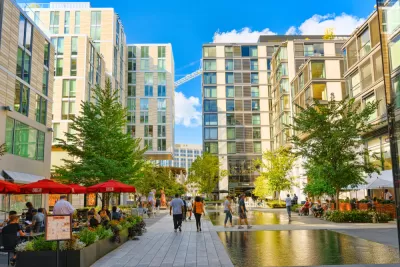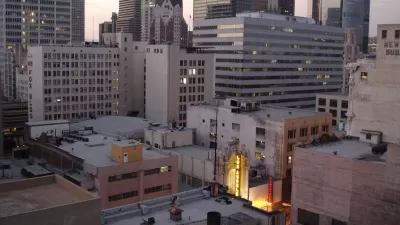Many urban cores around the country are faced with increasing office vacancies concurrently with a housing affordability crisis caused, at least in part, by a lack of supply. D.C. is particularly primed for a wave of adaptive reuse.

Josh Niland writes for Archinect: “Through the doldrums of America’s pandemic-triggered office downturn, the nation’s capital is quickly turning into a case study for the conversion of former commercial spaces into residential housing and mixed-use development.”
Niland’s assessment of the adaptive reuse market in the nation’s capital cites a number of sources, including a July article in the Washingtonian by Marisa M. Kashino that surveys various adaptive reuse projects (which Niland refers to as office conversions).
D.C.'s Deputy Mayor for Planning and Development, John Falcicchio, told Kashino that adaptive reuse can be useful for creating a 24-7 feel—especially in Downtown D.C. “We need to do [adaptive reuse] to save downtown,” says Falcicchio. “The only way to do that is to have a better mix of uses.”
Also cited is a 2019 report by the Metropolitan Washington Council of Governments indicating that the D.C. area needs to add 325,000 units before the end of the decade to keep pace with demand. The Lincoln Property Company estimated in spring 2022 that Washington, D.C. has an estimated 157.9 million square feet of rentable office space—a prime target for prospective developers.
Finally, Niland also references an article by Marissa J. Lang for the Washington Post from December 2021 when D.C. Mayor Muriel Bowser announced a new plan to spur adaptive reuse of vacant office buildings by “gathering input from current and prospective property owners on what they would need to consider transforming office structures into residences.”
Previous Planetizen coverage of adaptive reuse in the post-pandemic era (a Planetizen trend to watch in 2021):
FULL STORY: D.C. steps up office-to-residential conversions in the face of housing shortage

Planetizen Federal Action Tracker
A weekly monitor of how Trump’s orders and actions are impacting planners and planning in America.

Restaurant Patios Were a Pandemic Win — Why Were They so Hard to Keep?
Social distancing requirements and changes in travel patterns prompted cities to pilot new uses for street and sidewalk space. Then it got complicated.

Map: Where Senate Republicans Want to Sell Your Public Lands
For public land advocates, the Senate Republicans’ proposal to sell millions of acres of public land in the West is “the biggest fight of their careers.”

Maui's Vacation Rental Debate Turns Ugly
Verbal attacks, misinformation campaigns and fistfights plague a high-stakes debate to convert thousands of vacation rentals into long-term housing.

San Francisco Suspends Traffic Calming Amidst Record Deaths
Citing “a challenging fiscal landscape,” the city will cease the program on the heels of 42 traffic deaths, including 24 pedestrians.

California Homeless Arrests, Citations Spike After Ruling
An investigation reveals that anti-homeless actions increased up to 500% after Grants Pass v. Johnson — even in cities claiming no policy change.
Urban Design for Planners 1: Software Tools
This six-course series explores essential urban design concepts using open source software and equips planners with the tools they need to participate fully in the urban design process.
Planning for Universal Design
Learn the tools for implementing Universal Design in planning regulations.
Heyer Gruel & Associates PA
JM Goldson LLC
Custer County Colorado
City of Camden Redevelopment Agency
City of Astoria
Transportation Research & Education Center (TREC) at Portland State University
Camden Redevelopment Agency
City of Claremont
Municipality of Princeton (NJ)





























